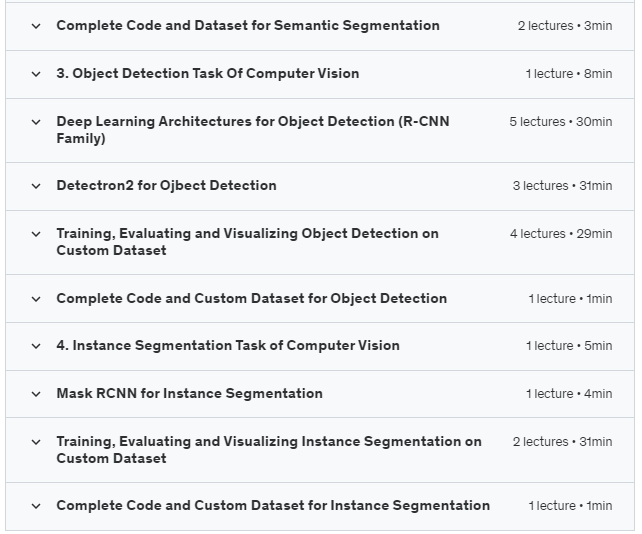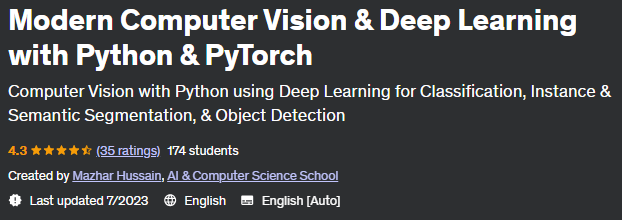Description
Modern Computer Vision & Deep Learning with Python & PyTorch course. Modern course on computer vision and deep learning with Python and PyTorch. Welcome to the training course “Modern computer vision and deep learning with Python and PyTorch”! Imagine if you could teach computers to see like humans. Computer Vision is a form of artificial intelligence (AI) that enables computers and machines to see the visual world, just like the way humans see and understand their environment. Artificial Intelligence (AI) enables computers to think, while Vision enables computers to see, observe and interpret. This course is specifically designed to provide a comprehensive and hands-on experience in applying deep learning techniques to core computer vision problems including image classification, semantic segmentation, pattern segmentation, and object recognition. In this course, you’ll start with an introduction to the fundamentals of computer vision and deep learning and learn how to implement, train, test, evaluate, and deploy your own models using Python and PyTorch for image classification, image segmentation, and object segmentation. diagnosis Computer vision plays a vital role in the development of self-driving vehicles. It enables the vehicle to perceive and perceive its surroundings to detect and classify various objects in the environment, such as pedestrians, vehicles, traffic signs and obstacles. This helps in making informed decisions for safe and efficient vehicle navigation. Computer Vision is used for surveillance and security using drones to track suspicious activity, intruders and objects of interest. It enables real-time surveillance and threat detection in public spaces, airports, banks and other security sensitive areas. Today, computer vision applications are very common in our daily lives, including face recognition in cameras and mobile phones, fingerprint and facial recognition device login, interactive games, MRI, CT scan, guided surgery. With pictures and more. This comprehensive course is specifically designed to provide hands-on experience in using Python and Python coding to build, train, test, and deploy your own models for core computer vision problems including image classification, image segmentation (semantic segmentation and instance segmentation), and object . diagnosis So, are you ready to unleash the power of computer vision and deep learning with Python and PyTorch:
- Mastery of advanced techniques and algorithms in the field of computer vision.
- Dive deep into the world of deep learning and get hands-on experience with Python and PyTorch, the industry-leading framework.
- Discover the secrets behind building intelligent systems that can understand, interpret and make decisions from visual data.
- Unlock the power to revolutionize industries like healthcare, autonomous systems, robotics, and more.
- Gain practical skills through immersive projects, real-world applications, and hands-on coding exercises.
- Gain insight into best practices, industry trends, and future directions in computer vision and deep learning.
What you will learn: This complete hands-on course covers Computer Vision tasks using Deep Learning with Python and PyTorch as follows:
- An introduction to computer vision and deep learning with real-world applications
- Learn deep convolutional neural networks (CNN) for computer vision
- You will use Google Colab notebooks to write Python code to classify images using deep learning models.
- Perform data preprocessing using various transformations such as image resizing and center cropping, etc.
- Perform two types of image classification, single-label classification and multi-label classification, using deep learning models with Python.
- You can learn transfer teaching techniques:
- 1. Transfer learning with FineTuning model.
- 2. Transfer learning using the model as a constant feature extractor.
- You will learn how to perform Data Augmentation.
- You will learn to fine-tune the Deep Resnet model.
- You will learn how to use the Deep Resnet model as a static feature extractor.
- You will learn how to optimize HyperParameters and visualize the results.
- Semantic image segmentation and its real-world applications in self-driving cars or self-driving vehicles, etc
- Perform sample segmentation using Mask RCNN on custom datasets with Pytorch and Python
What you will learn in Modern Computer Vision & Deep Learning with Python & PyTorch course
-
Learn computer vision and deep learning with real-world applications in Python
-
Learn deep convolutional neural networks (CNN) for computer vision
-
Computer Vision for single and multi-label classification with Python and Python
-
Computer Vision for Semantic Image Segmentation with Python and Python
-
Computer vision for image sample segmentation with Python and Python
-
Training models for segmentation, classification and image object recognition in custom datasets
-
Evaluation and deployment of image segmentation, image classification and object recognition models
-
Object detection using Detectron2 models introduced by Facebook Artificial Intelligence Research Group (FAIR)
-
Performing object detection using RCNN, Fast RCNN, faster RCNN models with Python and Pytorch
-
Performing Semantic Segmentation with UNet, PSPNet, DeepLab, PAN, and UNet++ Models with Pytoch and Python
-
Perform sample segmentation using Mask RCNN on custom datasets with Pytorch and Python
-
Performing single and multi-label image classification using deep learning models (ResNet, AlexNet) with Pytorch and Python
-
Visualization of the results, datasets, and full Python/Pythorch code for object classification, segmentation, and detection are provided.
This course is suitable for people who
- This course is designed for people interested in learning how to apply deep learning techniques to solve real-world computer vision problems using the Python programming language and the PyTorch deep learning framework.
- Computer vision engineers, AI enthusiasts, and researchers who want to learn how to use Python and PyTorch to build, train, and deploy deep learning models for computer vision problems.
- Machine learning engineers, deep learning engineers, and data scientists who want to apply deep learning to computer vision tasks.
- Developers, graduates and researchers who want to incorporate Computer Vision and Deep Learning capabilities into their projects.
- Overall, this course is for anyone who wants to learn how to use deep learning to extract meaning from visual data and gain a deeper understanding of the theory and practical applications of computer vision using Python and PyTorch.
Modern Computer Vision & Deep Learning with Python & PyTorch course specifications
- Publisher: Udemy
- teacher: Mazhar Hussain
- Training level: beginner to advanced
- Training duration: 7 hours and 45 minutes
- Number of courses: 75
Course topics Modern Computer Vision & Deep Learning with Python & PyTorch
Modern Computer Vision & Deep Learning with Python & PyTorch course prerequisites
- Computer Vision and Deep Learning with Python and Pytorch is taught in this course by following a complete pipeline from Zero to Mastery
- No prior knowledge of Computer Vision and Deep Learning is assumed. Everything will be covered with hands-on trainings
- A Google Gmail account is required to get started with Google Colab to write Python and PytorchCode
Course images
Sample video of the course
Installation guide
After Extract, view with your favorite Player.
Subtitle: None
Quality: 720p
download link
File(s) password: www.downloadly.ir
Size
3.4 GB

